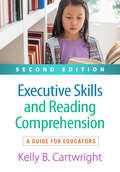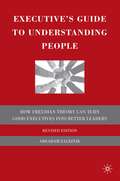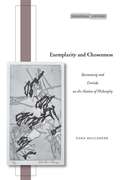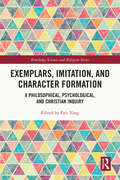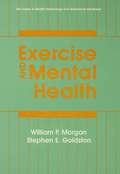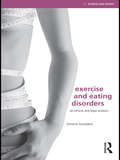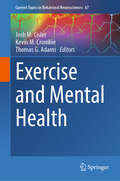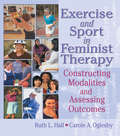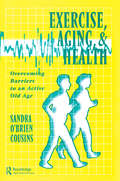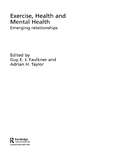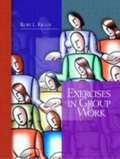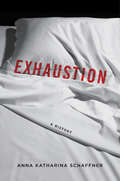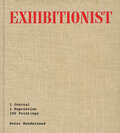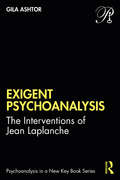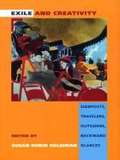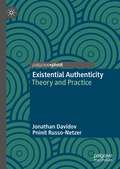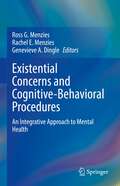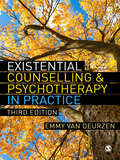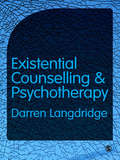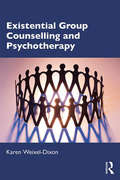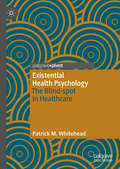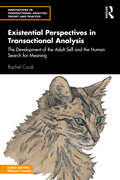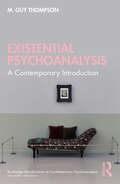- Table View
- List View
Executive Skills and Reading Comprehension: A Guide for Educators
by Kelly B. CartwrightThis pioneering book is now in a revised and expanded second edition featuring the latest neuroscientific knowledge and instructional strategies. Kelly B. Cartwright provides a teacher-friendly explanation of executive skills--such as planning, organization, cognitive flexibility, and impulse control--and their role in reading comprehension. Detailed examples illustrate how each skill is deployed by strong comprehenders and ways to tailor instruction for students who are struggling. The companion website features reproducible planning and assessment forms from the book as well as supplemental card sorts to teach and assess cognitive flexibility, all ready to download and print in a convenient 8 1/2" x 11" size. New to This Edition *Updated throughout with advances in theory, research, and instruction. *Chapter on word recognition, with particular attention to dyslexia. *Information on the development of the brain's reading network. *Expanded emphasis on oral language comprehension. *Appendix of intervention studies; online-only supplement with card sorts to teach and assess cognitive flexibility.
Executive’s Guide to Understanding People
by Abraham ZaleznikZaleznik takes managers into Freud's world of psychoanalysis and shows managers what they need to know about themselves and their employees to better motivate and lead. He discusses a variety of things relevant to today's top leaders including Freud's origin of psychoanalysis, the unconscious, neuroses, organizations and change.
Exemplarity and Chosenness
by Dana HollanderCrosnoe (sociology, U. of Texas, Austin) presents findings from the first-ever national study of the school readiness of Mexican immigrant children. As the number of Mexican immigrants to the U. S. continues to increase, the author argues, it is critical that we determine ways to improve the educational prospects of the Mexican immigrant children if they are to eventually become prosperous, productive, fulfilled citizens. The study examines various aspects of their lives--including health, the home environment, and childcare arrangements--to identify what helps and what hurts these children in the first years of elementary school, and concludes with some recommended social policy changes For educators, policymakers, and parents. Annotation ©2007 Book News, Inc. , Portland, OR (booknews. com)
Exemplars, Imitation, and Character Formation: A Philosophical, Psychological, and Christian Inquiry (Routledge Science and Religion Series)
by Eric YangThis volume examines the role and relevance of exemplars and the practice of imitation in character development and formation. While the role of exemplars and imitation in spiritual and moral formation has been an integral part of many religious and wisdom traditions, in recent times there has been limited theological and philosophical investigation into it and a dearth of interdisciplinary discussion. The book brings together relevant research and insights from leading experts within philosophy, psychology, and theology, with a slight emphasis on Christian approaches to exemplars and imitation, especially given the reflection on these themes throughout the history of the Christian intellectual and mystical tradition. Many of the contributions display an interdisciplinary approach into these issues; hence, this volume will be of interest to philosophers, psychologists, theologians, and others who work in moral psychology and character formation.
Exercise And Mental Health (Series in Health Psychology and Behavioral Medicine)
by William P. Morgan Stephen E. GoldstonPublished in the year 1987, Exercise and Mental Health is a valuable contribution to the field of Counseling and School Pscyhology.
Exercise and Eating Disorders: An Ethical and Legal Analysis (Ethics and Sport)
by Simona GiordanoEating disorders (EDs) have become a social epidemic in the developed world. This book addresses the close links between EDs and exercise, helping us to understand why people with EDs often exercise to excessive and potentially harmful levels. This is also the first book to examine this issue from an ethical and legal perspective, identifying the rights and responsibilities of people with EDs, their families and the fitness professionals and clinicians that work with them. The book offers an accessible account of EDs and closely examines the concept of addiction. Drawing on a wide range of medical, psychological, physiological, sociological and philosophical sources, the book examines the benefits and risks of exercise for the ED population, explores the links between EDs and other abuses of the body in the sports environment and addresses the issue of athletes with disordered eating behaviour. Importantly, the book also surveys current legislation and professional codes of conduct that guide the work of fitness professionals and clinicians in this area and presents a clear and thorough set of case histories and action points to help professionals better understand, and care for, their clients with EDs. Exercise and Eating Disorders is important reading for students of applied ethics, medical ethics and the ethics of sport, as well as for fitness professionals, psychiatrists, clinical psychologists, sports coaches and sport and exercise scientists looking to improve their understanding of this important issue.
Exercise and Mental Health (Current Topics in Behavioral Neurosciences #67)
by Josh M. Cisler Kevin M. Crombie Thomas G. AdamsThis edited volume describes key domains of the emerging research literature linking exercise and mental health. The volume is divided into three sections. The first section provides an overview of foundational knowledge regarding basic processes of exercise, including neurocircuitry, neurotransmitter, and immunology systems. The second section describes emerging research on the acute impact of exercise on affect, mood, and cognition. The third section explores the role of exercise in the etiology and treatment of related mental and physical health disorders, including depression, PTSD, eating disorders, and autoimmune disorders. Collectively, this volume provides readers with foundational knowledge of what exercise is, the basic brain, behavioral and cognitive processes engaged by exercise, and a role of exercise in developing and treating mental health disorders.
Exercise and Sport in Feminist Therapy: Constructing Modalities and Assessing Outcomes
by Ruth Hall Carole OglesbyIntegrate physical activity into feminist therapy!This book explores the healing use of exercise and sport as a helpful adjunct to therapy from several therapeutic orientations within the feminist context. It looks at the ways that feminist orientations challenge the mind-body dichotomy and explores the benefits of integrating physical activity, exercise, and sport into therapy. From the editors: "The contributors to this book display a diversity of theory and research approaches, including the integration of the exercise/sport sciences and exercise physiology. This volume is unique in that there has been comparatively little written about the use of exercise in therapy even though exercise is a wonderful and useful intervention tool in the treatment of depression, stress, anxiety disorders, and chronic pain. This book illustrates how exercise can be applied to inpatient and outpatient populations, to the neurotic, and to the chronically mentally ill. Exercise can reduce the incidence of chronic diseases, including diabetes and hypertension, as well as address physical problems such as obesity. Exercise can give one a sense of mastery and self-confidence. As our authors suggest, exercise must be tailored to specific issues and client populations and diagnoses, level of functioning, age, overall health, and cultural context must all be taken into account."Exercise and Sport in Feminist Therapy: Constructing Modalities and Assessing Outcomes examines: the theory supporting the use of physicality to enhance various types of psychotherapy-psychoanalytic, cognitive-behavioral, constructivist, narrative, and organismic/systems practical methods of integrating exercise into varied orientations an exercise program for women with fibromyalgia a way to use exercise to enhance rehabilitation from breast cancer the use of exercise in group therapy for women suffering with chronic mental illness the “tend and befriend” model, which can help clients to meet their exercise program responsibilities
Exercise, Aging and Health: Overcoming Barriers to an Active Old Age
by Sandra O'Brien CousinsAppropriate for professionals in gerontology, sports psychology, health psychology, physical education and social science programs that deal with older populations and community resources, this book first discusses the pros and cons of physical activity for older persons. It then explores the theoretical reasons for which older people do not pursue physical activity and how to overcome this reluctance. There is a model included, as well as implications for future social policy.
Exercise, Health and Mental Health: Emerging Relationships
by Guy E.J. Faulkner Adrian H. TaylorExercise, Health and Mental Health provides an introduction to this emerging field and a platform for future research and practice. Written by internationally acclaimed exercise, health and medical scientists, it is the first systematic review of the evidence for the potential role of exercise in: treating and managing mental health problems including dementia, schizophrenia, drug and alcohol dependence coping with chronic clinical conditions including cancer, heart disease and HIV/AIDS enhancing well-being in the general population – by improving sleep, assisting in smoking cessation, and as a way of addressing broader social issues such as anti-social behaviour. Adopting a consistent and accessible format, the research findings for each topic are clearly summarized and critically examined for their implications.
Exercises in Group Work
by Kurt L. KrausThis workbook is a study guide designed to accompany Gladding's Group Work: A Counseling Specialty (4th ed.). It also is designed to extend your learning through knowledge checks (mini quizzes), application and reflection (scenarios and vignettes to consider and respond to), individual and small group activities (reflecting on your classroom experiences, community opportunities, and others), a space to formalize reflections on any out-of-class group participation, and a variety of other opportunities to better develop your understanding of the complexities of group work.
Exes: A Novel
by Max Winter[A] heartbreaking novel about the devastations of severed attachments.” —NPRFor Clay Blackall, a lifelong resident of Providence, Rhode Island, the place has become an obsession. Here live the only people who can explain what happened to his brother, Eli, whose suicide haunts this heartbreaking, hilarious novel–in–fragments.A failed actor impersonates a former movie star; an ex–con looks after a summer home perched atop a rock in the bay; a broken–hearted salutatorian airs thirteen years’ worth of dirty laundry at his school’s commencement; an adjunct struggles to make room for her homeless and self–absorbed mother while revisiting a scandalous high school love affair; a recent widower, with the help of a clever teen, schemes to rid his condo’s pond of Canada geese. Clay compiles their stories, invasively providing context in the form of notes that lead always, somehow, back to Eli. Behind Clay’s possibly insane, definitely doomed, and increasingly suspect task burns his desire to understand his brother’s death, and the city that has defined and ruined them both.Full of brainy detours and irreverent asides, Exes is a powerful investigation of grief, love, and our deeply held yet ever–changing notions of home.
Exhaustion: A History
by Anna K. SchaffnerToday our fatigue feels chronic; our anxieties, amplified. Proliferating technologies command our attention. Many people complain of burnout, and economic instability and the threat of ecological catastrophe fill us with dread. We look to the past, imagining life to have once been simpler and slower, but extreme mental and physical stress is not a modern syndrome. Beginning in classical antiquity, this book demonstrates how exhaustion has always been with us and helps us evaluate more critically the narratives we tell ourselves about the phenomenon.Medical, cultural, literary, and biographical sources have cast exhaustion as a biochemical imbalance, a somatic ailment, a viral disease, and a spiritual failing. It has been linked to loss, the alignment of the planets, a perverse desire for death, and social and economic disruption. Pathologized, demonized, sexualized, and even weaponized, exhaustion unites the mind with the body and society in such a way that we attach larger questions of agency, willpower, and well-being to its symptoms. Mapping these political, ideological, and creative currents across centuries of human development, Exhaustion finds in our struggle to overcome weariness a more significant effort to master ourselves.
Exhaustion: A History
by Anna Katharina SchaffnerToday our fatigue feels chronic; our anxieties, amplified. Proliferating technologies command our attention. Many people complain of burnout, and economic instability and the threat of ecological catastrophe fill us with dread. We look to the past, imagining life to have once been simpler and slower, but extreme mental and physical stress is not a modern syndrome. Beginning in classical antiquity, this book demonstrates how exhaustion has always been with us and helps us evaluate more critically the narratives we tell ourselves about the phenomenon.Medical, cultural, literary, and biographical sources have cast exhaustion as a biochemical imbalance, a somatic ailment, a viral disease, and a spiritual failing. It has been linked to loss, the alignment of the planets, a perverse desire for death, and social and economic disruption. Pathologized, demonized, sexualized, and even weaponized, exhaustion unites the mind with the body and society in such a way that we attach larger questions of agency, willpower, and well-being to its symptoms. Mapping these political, ideological, and creative currents across centuries of human development, Exhaustion finds in our struggle to overcome weariness a more significant effort to master ourselves.
Exhibitionist: 1 Journal, 1 Depression, 100 Paintings
by Peter MendelsundFrom acclaimed designer and novelist Peter Mendelsund, a deeply personal reflection on depression and the redemptive power of art, interspersed with 100 original paintingsIn the early days of the pandemic, Peter Mendelsund and his family traveled up to a secluded New Hampshire farmhouse to weather the chaos. There began his journey through a crippling and seemingly intractable depression—which differed in degree but not in kind from episodes that have recurred periodically throughout his life—that brought him to the brink of suicide. Relief came from an unlikely source: painting, something Peter had never contemplated doing before. And yet it became the thing that may very well have saved his life. Bleakly funny, profoundly moving, and—against all odds—truly inspiring, Exhibitionist is not just an account of a mind thinking through its own suffering in real-time, and of the author&’s reckoning with his father's tortured legacy; it's also the story of the birth of an artist, and a portrait of an artist at work.
Exigent Psychoanalysis: The Interventions of Jean Laplanche (Psychoanalysis in a New Key Book Series)
by Gila AshtorExigent Psychoanalysis: The Interventions of Jean Laplanche offers a bold exploration of the contemporary psychoanalytic field by focusing on key issues through the lens of one of this century's most exacting and invigorating psychoanalytic theorists. Deliberately taking an integrative approach that spans a vast range of psychoanalytic ideas - with particular focus on the enduring tension between Freudian and Relational paradigms - Ashtor shows how a rigorous close reading of Laplanche’s work can disrupt stale binaries and forge new possibilities for revolutionizing the foundations of psychoanalysis. Organized as pointed interventions on such topics as metapsychology, motivation, the unconscious and psychic structure, Ashtor integrates cutting edge research on Affect theory and sexuality to demonstrate the potential for fieldwide innovation. Of interest to established and emerging clinicians alike and aimed at addressing a broad spectrum of theoretical positions, Exigent Psychoanalysis offers the first extensive clinical and theoretical study of Laplanche’s work, thus facilitating a timely and cutting-edge intervention in contemporary psychoanalytic debates.
Exile and Creativity: Signposts, Travelers, Outsiders, Backward Glances
by Susan Rubin SuleimanA major historical phenomenon of our century, exile has been a focal point for reflections about individual and cultural identity and problems of nationalism, racism, and war. Whether emigrés, exiles, expatriates, refugees, or nomads, these people all experience a distance from their homes and often their native languages. Exile and Creativity brings together the widely varied perspectives of nineteen distinguished European and American scholars and cultural critics to ask: Is exile a falling away from a source of creativity associated with the wholeness of home and one's own language, or is it a spur to creativity?In essays that range chronologically from the Renaissance to the 1990s, geographically from the Danube to the Andes, and historically from the Inquisition to the Holocaust, the complexities and tensions of exile and the diversity of its experiences are examined. Recognizing exile as an interior experience as much as a physical displacement, this collection discusses such varied topics as intellectual exile and seventeenth-century French literature; different versions of home and of the novel in the writings of Bakhtin and Lukács; the displacement of James Joyce and Clarice Lispector; a young journalist's meeting with James Baldwin in the south of France; Jean Renoir's Hollywood years; and reflections by the descendents of European emigrés. Strikingly, many of the essays are themselves the work of exiles, bearing out once more the power of the personal voice in scholarship.With the exception of the contribution by Henry Louis Gates Jr., these essays were originally published in a special double issue of Poetics Today in 1996. Exile and Creativity will engage a range of readers from those whose specific interests include the problems of displacement and diaspora and the European Holocaust to those whose broad interests include art, literary and cultural studies, history, film, and the nature of human creativity.Contributors. Zygmunt Bauman, Janet Bergstrom, Christine Brooke-Rose, Hélène Cixous, Tibor Dessewffy, Marianne Hirsch, Denis Hollier, Henry Louis Gates Jr., Linda Nochlin, Leo Spitzer, Susan Rubin Suleiman, Thomas Pavel, Doris Sommer, Nancy Huston, John Neubauer, Ernst van Alphen, Alicia Borinsky, Svetlana Boym, Jacqueline Chénieux-Gendron
Existential Authenticity: Theory and Practice
by Pninit Russo-Netzer Jonathan DavidovThis book draws on existential theory and original research to present the conceptual framework for an understanding of existential authenticity and demonstrates how this approach might be adopted in practice. The authors explore how a non-mediated connection with authentic lived experience might be established and introduced into everyday living. Drs. Jonathan Davidov and Pninit Russo-Netzer begin by introducing readers to the core theoretical concepts before illustrating how this might be applied in a therapeutic practice. It appeals to scholars and practitioners with an interest in existential psychology, phenomenology, and their broad implications.
Existential Concerns and Cognitive-Behavioral Procedures: An Integrative Approach to Mental Health
by Ross G. Menzies Rachel E. Menzies Genevieve A. DingleClients enter therapy grappling with a range of difficulties. They don’t speak in diagnostic terms, but instead focus on the everyday problems that confront them. Their struggles may include isolation, loneliness, anxiety, guilt and regret, and problems making decisions in a world that offers seemingly endless choice. In contrast, the cognitive-behavior therapist is trained in the language of conditioning and extinction, avoidance and safety behaviors, behavioral activation and attentional biases. This book explores the ideas of the existentialist philosophers as a bridge between the suffering client and technically trained clinician. The volume is not a rejection of cognitive behavior therapy (CBT), but seeks to place CBT in the broader context of the most popular philosophic tradition of the 19th and 20th centuries. Therapists versed in existentialism argue that the individual's starting point is characterized by a sense of disorientation in the face of an apparently meaningless and absurd world. Each individual must become solely responsible for giving meaning to life and living it passionately and authentically. Each of us must confront the ‘Big 5’ existential issues of death, isolation, identity, freedom and meaning and find our solutions to these problems. The present volume explores each of these existential themes in turn. Each section opens with a theoretical chapter describing the relevant existential dilemma and its impact on human experience. The second chapter in each section explores its relationship to mental health disorders and psychopathology. The third chapter in each section explores the evidence for treating the existential issue from a CBT framework. This book will be of value to those interested in CBT, philosophy and mental health, and will appeal to psychotherapists, clinical psychologists and psychiatrists.
Existential Counselling & Psychotherapy in Practice
by Emmy Van DeurzenOffering a concrete framework and practical methods for working from an existential perspective, the bestselling Existential Counselling and Psychotherapy is now in its third edition. Central to the book is the belief that many of our problems arise out of the essential paradoxes of human existence, rather than from personal pathology. From this perspective, the purpose of counselling and therapy is not viewed as problem-solving, but as a mean of enabling people to come to terms with living life as it is, with all its inherent contradictions. Emmy van Deurzen, a leading existential philosopher and therapist, presents a practical method of working, using systematic observation, clarification and reflection to help clients rediscover their inner strengths. She shows how personal assumptions, values and talents, once acknowledged, can be turned to constructive use. Using wide-ranging case examples, the author also demonstrates the effectiveness of the existential appoach in many different situations - from crisis work to dealing with chronic unhappiness. The existential approach is a well-respected form of psychotherapy, but most writing on the subject tends to be heavily theoretical. This book offers a practical and accessible alternative, which will be invaluable to those in training as well as to more experienced practitioners.
Existential Counselling and Psychotherapy
by Dr Darren Langdridge'Scholarly yet accessible, required reading for students of existential psychotherapy.' Tim Le Bon is a UKCP registered psychotherapist, life coach, philosophical counsellor and author of Wise Therapy This contemporary introduction provides a comprehensive survey of past and present existential ideas, philosophers and practice. Darren Langdridge makes existential therapy accessible through clear language, numerous case studies, chapter summaries, activities and further reading lists. The three parts cover all the key areas taught on existential therapy courses, from the fundamental theory of - and key figures in - the approach, to its application in practice. The final section advances theory and practice by exploring contemporary cross-cutting issues in existential therapy, including the role of research, power, politics, and language. Trainees to existential therapy will find in this book a comprehensive, practical overview of the key areas of theory and practice, while more experienced trainees and practitioners will gain insights into contemporary developments in existential therapy today. Dr Darren Langdridge is Head of the Department of Psychology at The Open University, Honorary Professor of Psychology at Aalborg University, Denmark and a UKCP accredited existential psychotherapist.
Existential Group Counselling and Psychotherapy
by Karen Weixel-DixonExistential Group Counselling and Psychotherapy provides a theoretical and practical foundation for practice. It serves as a guide that provides a solid grounding in the ‘why’ and ‘how’ of therapeutic group-work from an existential perspective. The first section of the book, Modern Origins, offers a review of modern western sources: a survey of early developments, what formats have endured, and to what extent these antecedents have informed, but are distinct from, current paradigms. The second section, Being and Doing, provides a description of the existential phenomenological paradigm for group therapeutic groupwork, reviewing possible therapeutic effects, as well as risks and disappointments that may affect both members, and facilitators. Part three, Doing and Being, covers practice, procedure, and possible problems. Written in a practical, accessible style, and incorporating clinical vignettes and anecdotal material, the book will be relevant for counsellors and psychotherapists in training and practice, as well as for special interest organisations that sponsor groups.
Existential Health Psychology: The Blind-spot in Healthcare
by Patrick M. WhiteheadThis volume critiques the increasingly reductive, objectifying, and technologized orientation in mainstream biomedicine. Drawing on the methods of hermeneutic phenomenology and existential analysis in the work of Martin Heidegger, Kurt Goldstein, Medard Boss, and Hans-Georg Gadamer, the author seeks to expose this lacuna and explore the ways in which it misrepresents (or misunderstands) the human condition. Whitehead begins by examining the core distinction in the sociology of medicine between “disease” and “illness” and how this distinction maps onto a more fundamental distinction between the corporeal/objective body and the experiential/lived body. Ultimately, the book exposes the tendency in modern medicine to medicalize the human condition and forwards a reorientation framed by what the author terms “existential health psychology.”
Existential Perspectives in Transactional Analysis: The Development of the Adult Self and the Human Search for Meaning (Innovations in Transactional Analysis: Theory and Practice)
by Rachel CookThis book offers experienced practitioners and trainees in psychotherapy and counselling a new, deeply personal and theoretically-grounded perspective on clinical work that integrates existential philosophy and psychotherapy into a relational transactional analysis.The author employs a multidisciplinary perspective grounded in the traditions of Berne’s transactional analysis, whilst providing an easily accessible explanation of existential psychotherapy and the existential givens of life. An innovative theory for the development of the adult self is offered that can be used to understand our human search for meaning and the existential life predicaments we all encounter as adults that may not originate from a difficult childhood. Using moving and personal clinical examples from her extensive professional experience as a psychotherapist, supervisor and trainer, the author highlights the different therapeutic skills that can be used when working from this stance, making this a highly practical guide for all practitioners.Whilst predominantly for psychotherapists, counsellors and students on psychotherapy training courses, this will be essential reading for all practitioners working with human beings in groups, education and organisations, as well as those who are new to the principles of existentialism and transactional analysis.
Existential Psychoanalysis: A Contemporary Introduction (Routledge Introductions to Contemporary Psychoanalysis)
by M. Guy ThompsonA fascinating introductory volume, Existential Psychoanalysis: A Contemporary Introduction integrates existential philosophy with psychoanalysis, drawing on key theorists from both areas and expertly guiding the reader on how to incorporate these two disciplines, which may appear disparate on the surface, into their clinical and theoretical work. This unique and accessible book sees M. Guy Thompson explore key concepts, such as experience, authenticity, freedom, psychic change, agency, and the pervasive role of suffering in our lives. Throughout, he draws on a wide range of thinkers from both fields, including Sartre, Heidegger, Nietzsche, Freud, Winnicott, Bion, Laing, and Lacan. Exquisitely lucid and engaging, Thompson deftly brings the reader into thoughtful and enlightening territory typically inaccessible to the general reader. Although existential philosophy and psychoanalysis are often thought of as incompatible fields, Thompson shows how they share far more in common than is usually supposed. This volume will help clinicians, scholars, and students of all persuasions learn how integrating the two disciplines introduces a more personal and revolutionary understanding of what psychoanalysis can be in the twenty-first century. This compelling assimilation of continental philosophy and psychoanalysis will be of interest to psychoanalytic practitioners and psychotherapists, as well as philosophers, social scientists and any student of the human condition.
